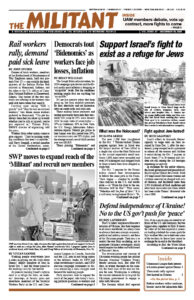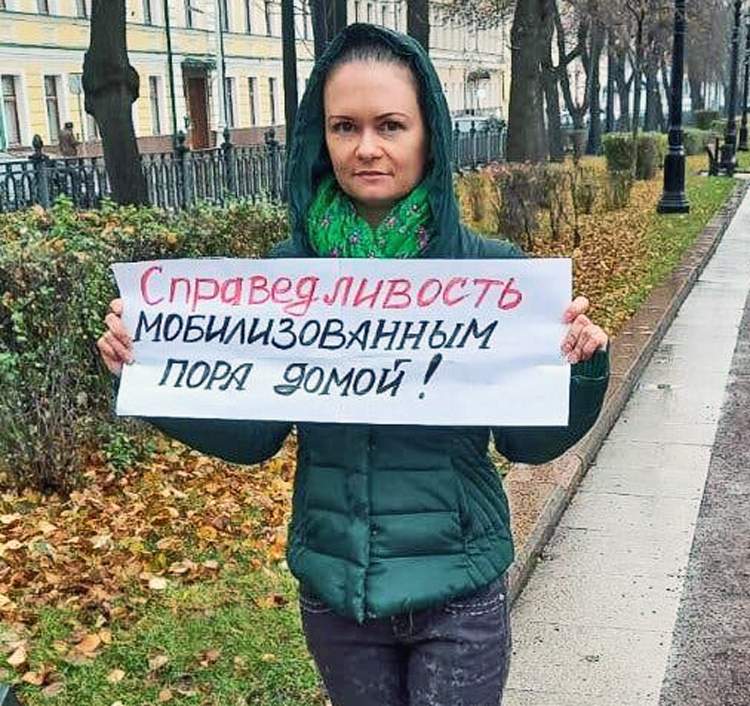The U.S. rulers’ response to Moscow’s invasion of Ukraine, like their response to all events worldwide, has always been to advance their own strategic economic, political and military interests, not those of the Ukrainian people. Their aim is to restrict the war from escalating, not to guarantee Ukraine’s sovereignty, which would require the defeat and withdrawal of Moscow’s forces.
The determination and courage of Ukrainian working people has pushed Russian President Vladimir Putin’s bloody invasion back. But after 650 days, as winter descends on the country, the front lines of the war are frozen for now. Washington is utilizing the current stalemate to try to push the Ukrainian government to engage in talks with Moscow.
The German tabloid Bild reported Nov. 24 on a secret plan circulated by officials of the U.S. and Germany, the two biggest arms suppliers to Kyiv. It shows the rulers of the two imperialist powers are leading a behind-the-scenes push for Kyiv to allow Moscow to hold onto some of the territory its forces have seized in exchange for an end to the bloodshed.
According to Bild, the White House and the Chancellery are coordinating pressure on Kyiv by making available only sufficient weapons for Ukrainian forces to maintain the current front line but not retake parts of Ukraine Moscow currently occupies. U.S. State Department spokesperson Vedant Patel denied Bild’s report, but another U.S. official told NBC, “there’s a growing sense that it’s too late, and it’s time to do a deal.”
Any compromise deal imposed on Kyiv will only give Putin time to try to consolidate his invasion, sowing the seeds for new and wider wars. Putin’s determination to wipe Ukraine and its people off the map remains unaltered.
Russian losses fuel opposition to war
The Kremlin is banking on pressure placed on Washington by a long war of attrition that would allow Moscow to outlast Ukrainian forces. Russia’s capitalist economy is being converted to war production with factories running shifts around the clock.
Putin issued a decree Dec. 1 for a 170,000-troop buildup to increase the army’s size to 1.3 million. He hopes to do this without an open mobilization, which would trigger protests like the one last year.
Russia’s population is over three times Ukraine’s. Authorities are sweeping up Central Asian migrants by raiding mosques, restaurants and markets where they work. Detainees are taken to military enlistment offices. Pressure is also mounting on prisoners, debtors and employees of state companies to join up.
Russian casualty rates are nearing staggering figures suffered by the czar’s army in World War I. Then an average of over 1,100 soldiers were killed each day. Today the figure is about 900 with a couple of days peaking at over 1,300 deaths, the Kyiv Post reports.
“We are abandoned,” a group of Russian soldiers say in a video circulated Dec. 1. They say they are not properly fed, have to provide their own medicine, and their commanders send them to slaughter, leaving the wounded to rot in the fields.
Reports surfaced Dec. 3 of revolts among Moscow’s units along the Dnipro riverbank after heavy losses. In one unit soldiers refused commands to recapture Ukrainian bridgehead positions there and on several islands, saying they didn’t have effective air and artillery cover. Russian troops there also suffered scores of deaths after being sent through their own minefields without maps. Their refusal to attack spread to other units stationed along the river.
Russian soldiers captured by Ukrainian troops describe their treatment at the hands of their officers. Pavel, a former machine-tool operator from Siberia, said his company had been ordered to take territory in northeastern Ukraine earlier this fall. “The captain said we fulfilled our goal. But how can you say that if only 35 out of 100 men come back? And that was just on one day.”
Protests were held in a number of Russian cities last month by the mothers and wives of soldiers, demanding troop rotation.
The Way Home group of soldiers’ relatives says the Kremlin promised troops mobilized in September 2022 would be home within a few months. “The promises turned out to be empty. We have been betrayed,” the group wrote Nov. 27. “The president declared 2024 the Year of the Family. This is ironic, given that wives howl without their husbands, children grow up without fathers and many are already orphans.”
The Kremlin accuses the organization of links to Western spy outfits.
“We will retreat only after our men are safe at home. Here and now we are creating the foundation of public solidarity against indefinite mobilization,” The Way Home responded.
In Moscow, 20 women Nov. 7 joined the edges of a legal Communist Party rally and raised the slogan “No to indefinite mobilization,” before cops took them away. In Novosibirsk authorities allowed soldiers’ relatives to hold a protest, but insisted it take place in a government building with most of the press banned.
The government is offering increased payments to soldiers’ families, “but only if we keep quiet,” Maria Andreeva told the New York Times. She held a solo protest in Moscow last month, carrying a sign reading “Justice. The mobilized need to come home.”
“Women need their husbands and sons, not payoffs,” she said.


